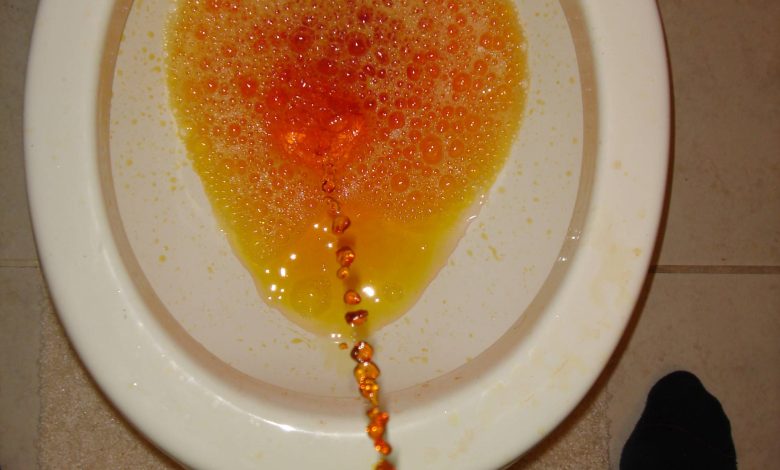Full List of Medications That Can Change Urine Color

Urine color can be an indicator of hydration levels and certain health conditions. Normally, urine should be a pale yellow or straw-like color, which indicates that you are properly hydrated. However, urine color can vary depending on several factors, such as food and drink consumption, medication use, and health conditions.
If urine is dark yellow, it usually indicates dehydration, which means that you need to drink more water. On the other hand, if urine is completely clear, it may indicate that you are overhydrated, and you should reduce your water intake.
In some cases, abnormal urine color can be a sign of an underlying health condition. For example, dark brown urine can indicate liver disease or muscle breakdown, while red or brown urine can be a sign of kidney disease or a urinary tract infection. Certain foods and drinks can also affect urine color. For example, consuming beets, blackberries, or rhubarb can cause urine to have a reddish or pinkish hue. Taking certain medications or supplements can also cause urine to turn bright yellow or orange.
What Medications Can Change Urine Color?
There are numerous drugs that can change the color of urine. Below is a list of 100 of the most common drugs that may cause a change in urine color, along with a brief explanation of how each drug may affect urine color:
1. Acetaminophen: May cause dark urine due to liver toxicity.
2. Acyclovir: May cause dark yellow or orange urine due to renal toxicity.
3. Allopurinol: May cause dark urine due to liver toxicity.
4. Alprazolam: May cause dark yellow or orange urine due to dehydration.
5. Amitriptyline: May cause dark yellow or orange urine due to dehydration.
6. Amoxicillin: May cause dark yellow or orange urine due to dehydration.
7. Aspirin: May cause dark urine due to kidney damage.
8. Atazanavir: May cause dark urine due to liver toxicity.
9. Atorvastatin: May cause dark yellow or orange urine due to dehydration.
10. Azithromycin: May cause dark urine due to liver toxicity.
11. Bactrim: May cause dark yellow or orange urine due to dehydration.
12. Benadryl: May cause dark yellow or orange urine due to dehydration.
13. Bismuth subsalicylate: May cause dark urine due to liver toxicity.
14. Buspirone: May cause dark yellow or orange urine due to dehydration.
15. Carbamazepine: May cause dark urine due to liver toxicity.
16. Cefixime: May cause dark urine due to renal toxicity.
17. Ceftriaxone: May cause dark urine due to liver toxicity.
18. Celecoxib: May cause dark yellow or orange urine due to dehydration.
19. Cephalexin: May cause dark yellow or orange urine due to dehydration.
20. Ciprofloxacin: May cause dark yellow or orange urine due to dehydration.
21. Clarithromycin: May cause dark urine due to liver toxicity.
22. Clindamycin: May cause dark urine due to liver toxicity.
23. Codeine: May cause dark yellow or orange urine due to dehydration.
24. Colchicine: May cause dark urine due to liver toxicity.
25. Cyclobenzaprine: May cause dark urine due to liver toxicity.
26. Darunavir: May cause dark urine due to liver toxicity.
27. Demerol: May cause dark yellow or orange urine due to dehydration.
28. Dexamethasone: May cause dark yellow or orange urine due to dehydration.
29. Diazepam: May cause dark yellow or orange urine due to dehydration.
30. Digoxin: May cause dark urine due to renal toxicity.
31. Diltiazem: May cause dark urine due to liver toxicity.
32. Diphenhydramine: May cause dark yellow or orange urine due to dehydration.
33. Doxycycline: May cause dark urine due to liver toxicity.
34. Enalapril: May cause dark urine due to liver toxicity.
35. Epinephrine: May cause dark urine due to liver toxicity.
36. Escitalopram: May cause dark yellow or orange urine due to dehydration.
37. Estradiol: May cause dark urine due to liver toxicity.
38. Ethinyl estradiol: May cause dark urine due to liver toxicity.
39. Famotidine: May cause dark urine due to liver toxicity.
40. Fentanyl: May cause dark yellow or orange urine due to dehydration.
41. Fexofenadine: May cause dark yellow or orange urine due to dehydration.
42. Fluconazole: May cause dark urine due to liver toxicity.
43. Fluoxetine: May cause dark yellow or orange urine due to dehydration.
44. Fluticasone: May cause dark yellow or orange urine due to dehydration.
45. Furosemide: May cause dark urine due to dehydration.
46. Gabapentin: May cause dark urine due to renal toxicity.
47. Gemfibrozil: May cause dark urine due to liver toxicity.
48. Hydrochlorothiazide: May cause dark urine due to dehydration.
49. Hydrocodone: May cause dark yellow or orange urine due to dehydration.
50. Ibuprofen: May cause dark urine due to kidney damage.
51. Imipramine: May cause dark yellow or orange urine due to dehydration.
52. Indomethacin: May cause dark urine due to kidney damage.
53. Isoniazid: May cause dark urine due to liver toxicity.
54. Ketorolac: May cause dark urine due to kidney damage.
55. Labetalol: May cause dark urine due to liver toxicity.
56. Lamotrigine: May cause dark yellow or orange urine due to dehydration.
57. Lansoprazole: May cause dark urine due to liver toxicity.
58. Levetiracetam: May cause dark yellow or orange urine due to dehydration.
59. Levofloxacin: May cause dark yellow or orange urine due to dehydration.
60. Lisinopril: May cause dark urine due to liver toxicity.
61. Lithium: May cause dark urine due to renal toxicity.
62. Loratadine: May cause dark yellow or orange urine due to dehydration.
63. Losartan: May cause dark urine due to liver toxicity.
64. Lovastatin: May cause dark yellow or orange urine due to dehydration.
65. Meclizine: May cause dark yellow or orange urine due to dehydration.
66. Medroxyprogesterone: May cause dark urine due to liver toxicity.
67. Meloxicam: May cause dark urine due to kidney damage.
68. Methotrexate: May cause dark urine due to liver toxicity.
69. Metoprolol: May cause dark urine due to liver toxicity.
70. Midazolam: May cause dark yellow or orange urine due to dehydration.
71. Mirtazapine: May cause dark yellow or orange urine due to dehydration.
72. Montelukast: May cause dark yellow or orange urine due to dehydration.
73. Morphine: May cause dark yellow or orange urine due to dehydration.
74. Naproxen: May cause dark urine due to kidney damage.
75. Niacin: May cause dark yellow or orange urine due to dehydration.
76. Nitrofurantoin: May cause dark urine due to liver toxicity.
77. Omeprazole: May cause dark urine due to liver toxicity.
78. Oxycodone: May cause dark yellow or orange urine due to dehydration.
79. Pantoprazole: May cause dark urine due to liver toxicity.
80. Paroxetine: May cause dark yellow or orange urine due to dehydration.
81. Phenazopyridine: May cause bright orange or red urine due to its mechanism of action.
82. Phenobarbital: May cause dark urine due to liver toxicity.
83. Phenytoin: May cause dark urine due to liver toxicity.
84. Prednisone: May cause dark yellow or orange urine due to dehydration.
85. Propranolol: May cause dark urine due to liver toxicity.
86. Quetiapine: May cause dark yellow or orange urine due to dehydration.
87. Quinapril: May cause dark urine due to liver toxicity.
88. Ramipril: May cause dark urine due to liver toxicity. 89
89. Ranitidine: May cause dark urine due to liver toxicity.
90. Rosuvastatin: May cause dark yellow or orange urine due to dehydration.
91. Sertraline: May cause dark yellow or orange urine due to dehydration.
92. Simvastatin: May cause dark yellow or orange urine due to dehydration.
93. Sulfamethoxazole-trimethoprim: May cause dark yellow or orange urine due to dehydration.
94. Tacrolimus: May cause dark urine due to renal toxicity.
95. Tamsulosin: May cause dark urine due to dehydration.
96. Temazepam: May cause dark yellow or orange urine due to dehydration.
97. Terazosin: May cause dark urine due to dehydration.
98. Topiramate: May cause dark yellow or orange urine due to dehydration.
99. Trazodone: May cause dark yellow or orange urine due to dehydration.
100. Warfarin: May cause dark urine due to liver toxicity.
It is important to note that changes in urine color caused by medications are usually harmless and temporary. However, if you experience other symptoms like pain, fever, or difficulty urinating, it is important to contact your healthcare provider.





